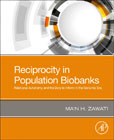
Reciprocity in Population Biobanks: Relational Autonomy and the Duty to Inform in the Genomic Era
Zawati, Ma'n H.
Reciprocity in Population Biobanks: Relational Autonomy and the Duty to Inform in the Genomic Era begins by discussing how current judicial interpretation keeps standard of disclosure at the core of genomic research. The book then outlines multiple limitations individualistic autonomy faces in the context of gene and population biobanks, including an analysis of the complexities of benefit considerations in the research setting. Second, the book explores how individualistic autonomy fails to acknowledge the multilateral relationships implicated in genomic research, including those that affect the broader research community, research participants' families, and the general public. In carrying out this analysis, this book pays special attention to alternative approaches and ways researchers, public health officials, and judicial bodies might interact in years to come. In other words, implementing an understanding of relational autonomy that acknowledges and sustains the multilateral relationships found in genomic research without compromising the rights of participants. In short, this book proposes a reconceived duty to inform for researchers and a new standard of disclosure that is more meaningful and impactful for research participants and researchers. Examines the limitations individualistic autonomy faces in the context of gene and population biobanks Proposes a reconceived duty to inform for researchers and a new standard of disclosure more meaningful to genomic research participants Suggests ways researchers, public health officials, and judicial bodies might interact to drive genomic research while still protecting research participants INDICE: 1. From Paternalism to the Individualistic Conception of Autonomy: A Brief Overview of The Evolution of the Medical Duty to Inform in the 20th Century 2. Characteristics of Population Biobanks 3. The Duty to Inform of Researchers in Population Biobanks 4. Limitations of The Individualistic Conception of Autonomy in Population Biobanking 5. The Concept of Reciprocity: Origins and Key Elements 6. Toward a Reciprocity-Based Relational Autonomy for Population Biobanks: Advantages and Limitations
- ISBN: 978-0-323-91286-0
- Editorial: Academic Press
- Encuadernacion: Rústica
- Páginas: 202
- Fecha Publicación: 23/09/2021
- Nº Volúmenes: 1
- Idioma: Inglés
